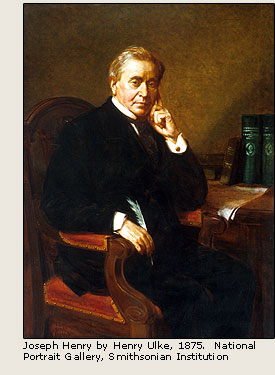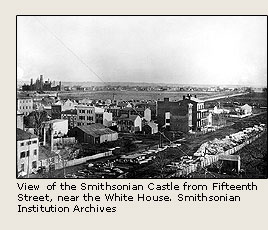|
|
 |
 ince
its completion in 1855, the Smithsonian Castle was both
home and workplace for the institution's first secretary,
Joseph Henry, and his family. Henry was an eminent American
scientist and educator at the College of New Jersey (Princeton)
before being selected to head the new institution in 1846.
He was a pioneer in the field of electromagnetism and
the telegraph, and he invented the electric motor. He
was also thoroughly committed to making the Smithsonian
worthy of its mandate to increase and diffuse knowledge
throughout the world. Curiously, Henry’s vision for the
Smithsonian was not the modern complex of extensive buildings
and multiple museums America knows today. He thought the
Smithsonian endowment of roughly half a million dollars
could not support the cost of building museums, which
he believed would be impractical for most nineteenth-century
Americans to ever visit. Henry had not even been in favor
of the building of the Castle. Rather, he envisioned an
institution whose core mission was intellectual and whose
realm of inquiry was international. He favored the dissemination
of knowledge in a wide range of fields, including physics,
astronomy, chemistry, natural history, and archaeology,
through an annual publication called Smithsonian Contributions
to Knowledge. Publications of this kind were expensive
to produce, especially if they contained lithographic
illustrations. Henry believed the institution could financially
assist scientists in the publication of their findings
and also encourage the foreign exchange of scientific
papers and journals. ince
its completion in 1855, the Smithsonian Castle was both
home and workplace for the institution's first secretary,
Joseph Henry, and his family. Henry was an eminent American
scientist and educator at the College of New Jersey (Princeton)
before being selected to head the new institution in 1846.
He was a pioneer in the field of electromagnetism and
the telegraph, and he invented the electric motor. He
was also thoroughly committed to making the Smithsonian
worthy of its mandate to increase and diffuse knowledge
throughout the world. Curiously, Henry’s vision for the
Smithsonian was not the modern complex of extensive buildings
and multiple museums America knows today. He thought the
Smithsonian endowment of roughly half a million dollars
could not support the cost of building museums, which
he believed would be impractical for most nineteenth-century
Americans to ever visit. Henry had not even been in favor
of the building of the Castle. Rather, he envisioned an
institution whose core mission was intellectual and whose
realm of inquiry was international. He favored the dissemination
of knowledge in a wide range of fields, including physics,
astronomy, chemistry, natural history, and archaeology,
through an annual publication called Smithsonian Contributions
to Knowledge. Publications of this kind were expensive
to produce, especially if they contained lithographic
illustrations. Henry believed the institution could financially
assist scientists in the publication of their findings
and also encourage the foreign exchange of scientific
papers and journals.

|

 |
|
|
|